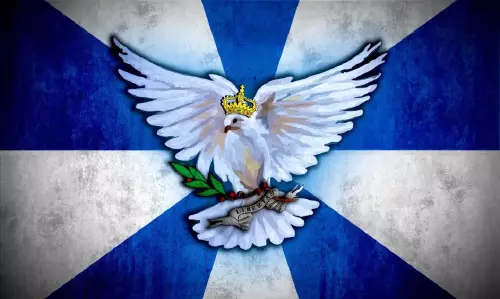This nation is in Vacation Mode for the next 3,534 turns. This nation cannot be attacked or traded with during that time.
| National Factbook |
| Flag: |

|
| Nation Name: |
Freidonia Empire |
| Leader Name: |
Robert Nuzganov |
| Currency: |

Buran |
| National Animal: |

Golden eagle |
| History: |
The Freidonia Empire has a rich and multifaceted history that reflects its unique blend of cultures, economies, and political structures. Its formation is a tale of ambition, unity, and resilience.
The region that would become Freidonia was originally inhabited by various tribes, each with their own customs and governance systems. The strategic location of these tribes along important trade routes facilitated cultural exchange and economic prosperity, laying the groundwork for future unity.
In the early centuries, leaders from the tribes convened a series of councils to discuss common interests and the potential for unification against external threats. In Year 250, the Treaty of Concord was signed, marking the first significant step towards the unification of the tribes. It established mutual defense agreements and shared resources.
By Year 500, the united tribes transitioned from a loose confederation to a more structured monarchy, officially becoming the Freidonia Kingdom. This period saw a flourishing of arts, science, and philosophy, with the establishment of educational institutions and marketplaces.
In Year 800, the Freidonia Kingdom began a series of expansionist campaigns against neighboring territories, driven by both economic desires and the need for security. The pivotal conquest of Eldoria in Year 850 brought vast resources and new populations under Freidonia's influence, enabling the transition from a kingdom to an empire.
In Year 900, the ruling monarch declared the formation of the Freidonia Empire, marking a new era of governance, culture, and commerce. The empire implemented administrative reforms to manage its diverse territories, creating a more centralized government while respecting local customs.
The empire became a melting pot of cultures, fostering tolerance and collaboration among its various ethnic groups. Freidonia adopted a mixed economy, combining elements of both free market and state-controlled economies, which facilitated trade and innovation.
In recent centuries, the Freidonia Empire has emerged as a significant player on the global stage, known for its economic prowess and cultural contributions. Despite facing challenges such as political strife and external threats, the empire has shown remarkable resilience and adaptability, continuing to thrive in the modern world.
The Freidonia Empire is a testament to the power of unity and ambition. From its humble beginnings as a collection of tribes to its current status as a formidable empire, its history is a rich tapestry of diversity, culture, and economic prowess. |
| Geography |
| Continent: |
Europe |
| Land Area: |
84,490.35 sq. km |
| Terrain: |
Freidonia Empire Terrain Description:
- Mountains and Plateaus: The Freidonia Empire boasts a majestic mountain range that spans from the northern European territories to the southern African regions, creating a stunning backdrop of towering peaks and expansive plateaus. These mountains are home to diverse ecosystems and rare species.
- Desert and Forest: In the African territories of the Freidonia Empire, a vast desert akin to the Sahara stretches across the landscape, characterized by shifting sand dunes and extreme aridity. Transitioning into the European territories, lush forests thrive with ancient trees, dense vegetation, and a rich variety of wildlife.
- Coastal Diversity: Along the coastal regions that border both continents, the Freidonia Empire showcases a diverse range of landscapes, from sandy beaches to rugged cliffs and secluded coves. The meeting of the Mediterranean and Atlantic waters creates a unique marine environment teeming with marine life.
- Islands and Archipelagos: Off the shores of the Freidonia Empire, scattered islands and archipelagos dot the seas, offering a blend of tropical paradise and rugged terrain. These islands serve as cultural melting pots, reflecting a harmonious fusion of European and African traditions and histories.
- River Systems: The Freidonia Empire is crisscrossed by mighty rivers originating in the mountainous regions and flowing through the various territories, providing vital water sources for agriculture, trade, and sustaining diverse ecosystems along their banks.
The Freidonia Empire's diverse and captivating terrain showcases a harmonious blend of European and African landscapes, offering a rich tapestry of natural beauty, cultural diversity, and exploration opportunities for its inhabitants and visitors alike. |
| Highest Peak: |
Ismoil Somoni Peak,
7 meters
|
| Lowest Valley: |
Qattara Depression,
-133 meters
|
| Climate: |
The climate of the Freidonia Empire is influenced by its diverse terrain that spans both the European and African continents. Here is a detailed description of the climate in the Freidonia Empire:
Temperature: The Freidonia Empire experiences a range of temperatures due to its varied landscapes. The northern European territories may have cooler temperatures, while the southern African regions could be warmer.
Precipitation: The amount of rainfall in the Freidonia Empire varies across its territories. The African desert regions may receive minimal rainfall, leading to arid conditions, while the European forests could experience more precipitation.
Seasons: The Freidonia Empire likely has distinct seasons, with the European territories experiencing traditional seasons like spring, summer, autumn, and winter, while the African regions may have dry and wet seasons.
Climate Zones: The Freidonia Empire may have different climate zones within its borders, ranging from arid deserts in the south to temperate forests in the north, creating a diverse climate mosaic.
Weather Patterns: The Freidonia Empire's weather patterns could be influenced by its proximity to both the Mediterranean and Atlantic oceans, leading to unique weather phenomena and microclimates.
Overall, the climate in the Freidonia Empire is likely characterized by a blend of European and African climate features, offering a diverse and captivating environment for its inhabitants and visitors. |
| People & Society |
| Population: |
3,646,224 people |
| Demonym: |
Freidonian |
| Demonym Plural: |
Freidonians |
| Ethnic Groups: |
Orbisian - 67.8%
Euafrican - 21.9%
Others - 10.4% |
| Languages: |
Freitonian - 87.4%
English - 94.3%
Others - 34.5% |
| Religions: |
Islam - 56.7%
Cristianity - 32.5%
Others - 10.5% |
| Health |
| Life Expectancy: |
80 years |
| Obesity: |
14.4% |
| Alcohol Users: |
0.6% |
| Tobacco Users: |
0.1% |
| Cannabis Users: |
0.6% |
| Hard Drug Users: |
1.5% |
| Economy |
| Description: |
The Freidonia Empire operates a mixed economy system that combines elements of both capitalism and socialism, while also integrating Islamic economic values. This approach creates a balanced framework for economic management, promoting both growth and social responsibility.
In the Freidonia Empire's mixed economy with Islamic economic values:
The private sector is vibrant and innovative, with various businesses ranging from small enterprises to large corporations. These businesses drive economic growth, create jobs, and foster competition, while adhering to ethical guidelines that align with Islamic principles.
The public sector plays a significant role by providing essential services such as healthcare, education, and infrastructure. The government invests in these areas to ensure access for all citizens, reflecting the Islamic value of social justice and community welfare.
The economy encourages entrepreneurship and innovation, supporting small and medium-sized enterprises (SMEs) through various programs, including grants and tax incentives. This fosters a culture of creativity while emphasizing ethical business practices, such as avoiding excessive risk and speculation (gharar).
Regulatory frameworks promote fair competition and protect consumers, ensuring that businesses operate with integrity and social responsibility. This aligns with the Islamic principle of fairness in trade and transactions.
Wealth distribution is addressed through progressive taxation and social welfare programs, which aim to reduce inequality and support disadvantaged groups. This reflects the Islamic tenet of zakat, where a portion of wealth is given to charity to assist those in need.
The economy emphasizes sustainability and environmental stewardship, encouraging practices that protect natural resources and promote responsible consumption, in line with Islamic teachings on the responsible use of resources.
Overall, the Freidonia Empire's mixed economy system, enriched by Islamic economic values, strives to harness the benefits of free markets and government intervention while promoting ethical practices, social equity, and sustainable development. This approach reflects the Empire's commitment to fostering a prosperous and inclusive society for all its citizens, grounded in moral principles and community welfare. |
| Average Yearly Income: |
$188.26 |
| Gross Domestic Product (GDP): |
$7,984,417,888.00 |
| GDP per Capita: |
$2,189.78 |
| Gross National Income (GNI): |
$5,081,244,935.00 |
| Industries: |
The Freidonia Empire boasts a diverse and robust industrial sector that plays a critical role in its economy and overall development. Key industries in the Empire include:
- Manufacturing: This sector is a cornerstone of the Freidonia Empire's economy, producing a wide range of goods from consumer products to industrial machinery. The emphasis is on quality and innovation, with many manufacturers adopting advanced technologies and practices to enhance productivity and competitiveness.
- Agriculture: Agriculture remains vital to the Empire, with a focus on sustainable practices and organic farming. The Empire produces a variety of crops and livestock, ensuring food security and contributing to both domestic consumption and export markets.
- Textiles: The textile industry is significant in the Freidonia Empire, known for its high-quality fabrics and garments. Traditional craftsmanship is combined with modern manufacturing techniques, allowing for both unique designs and large-scale production.
- Technology and IT: The technology sector is rapidly growing, with the Empire investing in research and development. Startups and established companies are creating innovative software solutions, apps, and digital services, contributing to economic growth and job creation.
- Energy: The Freidonia Empire is committed to diversifying its energy sources, investing in both renewable energy (such as solar and wind) and traditional energy sectors. This commitment to sustainable energy reflects its focus on environmental responsibility and reducing dependence on fossil fuels.
- Tourism: With its rich cultural heritage and natural beauty, tourism is a booming industry in the Freidonia Empire. The Empire promotes eco-tourism and cultural experiences, attracting visitors from around the world and providing significant revenue for local communities.
- Construction and Real Estate: The construction industry is thriving, driven by urbanization and infrastructure development. The Empire is focused on building sustainable and modern housing, commercial spaces, and public facilities to meet the needs of its growing population.
- Pharmaceuticals and Healthcare: This industry is crucial for public health, with the Freidonia Empire investing in research, production, and distribution of medicines and healthcare services. The focus is on accessibility and affordability, ensuring that all citizens have access to quality healthcare.
Overall, the industries in the Freidonia Empire are characterized by a blend of traditional practices and modern techniques, reflecting the Empire's commitment to innovation, sustainability, and economic growth. The diverse industrial landscape not only supports the economy but also enhances the quality of life for its citizens. |
| Military |
| History: |
The Ministry of Defence of the Freidonia Empire is essential to national security, encompassing various branches and intelligence agencies. Below is a comprehensive overview, including notable special forces, key battalions, military equipment, and specific assets across the Army, Navy, Air Force, Coast Guard, Marines, Space Force, and Intelligence Agencies.
Key Responsibilities:
- Formulating defence policy
- Resource management
- Coordination of armed forces
- National security measures
Branches of the Ministry of Defence:
1. Army
- Ground force responsible for land-based military operations.
- Includes infantry, armor, and artillery.
- Freidonian Frogmen: Elite special forces specializing in amphibious operations.
- Logistics and Support: Manages supply chain and maintenance.
- Notable Battalions:
- Red Barrettes: Para battalion specializing in airborne operations.
- Border Patrol Battalion: Secures and monitors national borders.
- Well-Known Equipment:
- T-5 "Joker" Main Battle Tank: Advanced tank known for firepower.
- AH-5 "Cobra" Attack Helicopter: Versatile helicopter for close air support.
- Rapid Response Team (RRT): Protects royal families and government ministers.
2. Navy
- Maritime force conducting naval operations.
- Navy Carrier Group: Includes aircraft carriers and support vessels.
- Well-Known Naval Aircraft:
- AF-5C Navalized Air Superiority Multirole Stealth Fighter: Designed for carrier operations.
- Kommando Spezialkräfte Marine (KSM): Elite special forces for naval operations.
3. Air Force
- Aerial branch conducting air operations.
- Well-Known Aircraft:
- AF-5 "Black Widow" Air Superiority Stealth Fighter: Advanced stealth fighter.
- AF-6 "White Widow" Multirole Stealth Fighter: Versatile stealth fighter.
- AA-5 "Daredevil" Attack Aircraft: Specialized for ground support.
- Nightwalkers: Specialized unit trained for nighttime operations.
4. Coast Guard
- Responsible for maritime safety and security.
- Conducts search and rescue operations and enforces maritime laws.
5. Marines
- Amphibious force specializing in rapid deployment.
- Marine Raider Regiment (MRR): Elite special forces focused on unconventional warfare.
6. Space Force
- Dedicated branch for space operations and defence.
7. Intelligence Agencies
- MI5: Domestic counter-intelligence and security.
- MI6: Foreign intelligence and espionage operations.
- Mobile Task Force (MTF): Rapid-response unit within MI6.
- MI9: Counter-intelligence and support for military operations.
- MI01: Focuses on foreign rapid counter-terrorism.
- National Communications Headquarters (NCHQ): Provides signals intelligence and information assurance.
- National Reconnaissance Office (NRO): Manages reconnaissance satellites.
The Ministry of Defence ensures the Freidonia Empire's security through its diverse branches and elite units, including the Freidonian Frogmen and Marine Raider Regiment. Advanced equipment and specialized intelligence agencies contribute to a robust defense strategy, addressing various threats and challenges effectively. |
| Soldiers: |
0 |
| Tanks: |
0 |
| Aircraft: |
0 |
| Ships: |
0 |
| Missiles: |
0 |
| Nuclear Weapons: |
0 |
| Last Updated: 09/13/2024 02:53 pm |



















